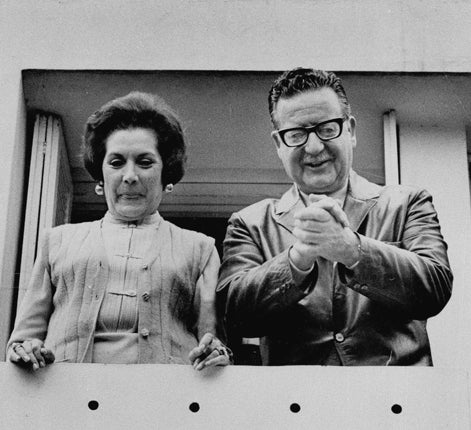Hortensia Bussi De Allende: Widow of Salvador Allende who helped lead opposition to Chile's military dictatorship

Your support helps us to tell the story
From reproductive rights to climate change to Big Tech, The Independent is on the ground when the story is developing. Whether it's investigating the financials of Elon Musk's pro-Trump PAC or producing our latest documentary, 'The A Word', which shines a light on the American women fighting for reproductive rights, we know how important it is to parse out the facts from the messaging.
At such a critical moment in US history, we need reporters on the ground. Your donation allows us to keep sending journalists to speak to both sides of the story.
The Independent is trusted by Americans across the entire political spectrum. And unlike many other quality news outlets, we choose not to lock Americans out of our reporting and analysis with paywalls. We believe quality journalism should be available to everyone, paid for by those who can afford it.
Your support makes all the difference.Hortensia Bussi de Allende will inevitably, and she always said "proudly," be remembered as the widow of Salvador Allende, the democratically elected Marxist president of Chile who died in a coup d'état launched by General Augusto Pinochet in 1973.
But to those Chileans who fought for democracy during the dark years of dictatorship, she was respected, even revered in her own right.
After her husband's death during Pinochet's air and ground attack on the presidential palace in Santiago, Bussi fled Pinochet's death squads and went on, in exile based in Mexico, to become a campaigner for democracy and human rights in her homeland and the other military-oppressed Latin American nations of the time. Known nationally by her nickname Tencha, she became a figurehead among her leftist or moderate compatriots who eventually prevailed over Pinochet in a 1988 referendum, allowing her to return home after 15 years.
She died, however, knowing that a large percentage of her compatriots still revere the Pinochet more than her Marxist husband or her and, therefore, that democracy can by no means be taken for granted in her homeland. For that reason, for almost 20 years until her death, and despite many bodyguards, she rarely set foot outside her home in Santiago.
The daughter of a merchant marine officer, Hortensia Bussi was born in the bustling Pacific port city of Valparaíso – "Valpo" to Chileans – on 22 July, 1914. A teacher, and eventually university professor of history and geography, she met Salvador Allende Gossens while they were both involved in a campaign to help the victims of a major earthquake in southern Chile in January 1939 which left around 50,000 people dead. They married on 17 March the following year.
Bussi supported her husband, an avowed Marxist, during three presidential campaigns in the 1950s and '60s until he was finally elected president in 1970, to the chagrin of the US administration and notably the Central Intelligence Agency, which resolved to remove this particular thorn from their flesh. As Primera Dama [First Lady], she headed several state institutions, notably for the welfare of women.
On 11 September 1973 – to Chileans old enough, 11 September means 1973, not 2001 – Pinochet, the army commander, ordered the attack on the presidential palace in the heart of Santiago. Allende, last photographed carrying an automatic weapon, was later found dead from a bullet wound to the head. The official version, even among many of his supporters, is that he shot himself rather than surrender. To this day, some believe he was shot by the military. At the time, his wife was in the presidential residence on Santiago's elegant Tomás Moro street, which was also bombed and shot at by Pinochet's forces. "Between each bomb, there was a mad outbreak of gunfire," Hortensia Bussi later recalled. "The residence became a mass of smoke, the smell of gunpowder and destruction."
She was taken by the military to Valparaíso – also her husband's hometown – to attend a secret burial. She later complained that the military had sealed the coffin to prevent her from seeing her husband, or his wounds. Under threat to her own life, she was granted political asylum by Mexico and flown there in a private plane five days after the coup.
During her 15 years in exile, she travelled the world, often under the pseudonym Flor García to confound Pinochet's intelligence agents, meeting heads of state to push for democracy in her homeland. Although a fervent socialist, she famously called on the Cuban leader Fidel Castro, one of her father's strongest backers during his political career and presidency, to hold free elections.
On Bussi's 94th birthday last year, the Chilean President Michelle Bachelet, whose father served in Allende's cabinet, lauded her "enormous commitment, yesterday and today, to our democracy."
One of Hortensia Bussi de Allende's daughters, Beatriz, committed suicide in 1977. She is survived by her other two daughters, Carmen Paz and Isabel, the latter a member of parliament for the Socialist Party (often confused with the writer Isabel Allende, who is a distant relative).
Hortensia Bussi Soto de Allende, former First Lady of Chile: born Valparaíso, 22 July 1914; married 1940 Salvador Allende (died 1973, two daughters, and one deceased); died Santiago 18 June 2009.
Join our commenting forum
Join thought-provoking conversations, follow other Independent readers and see their replies
Comments